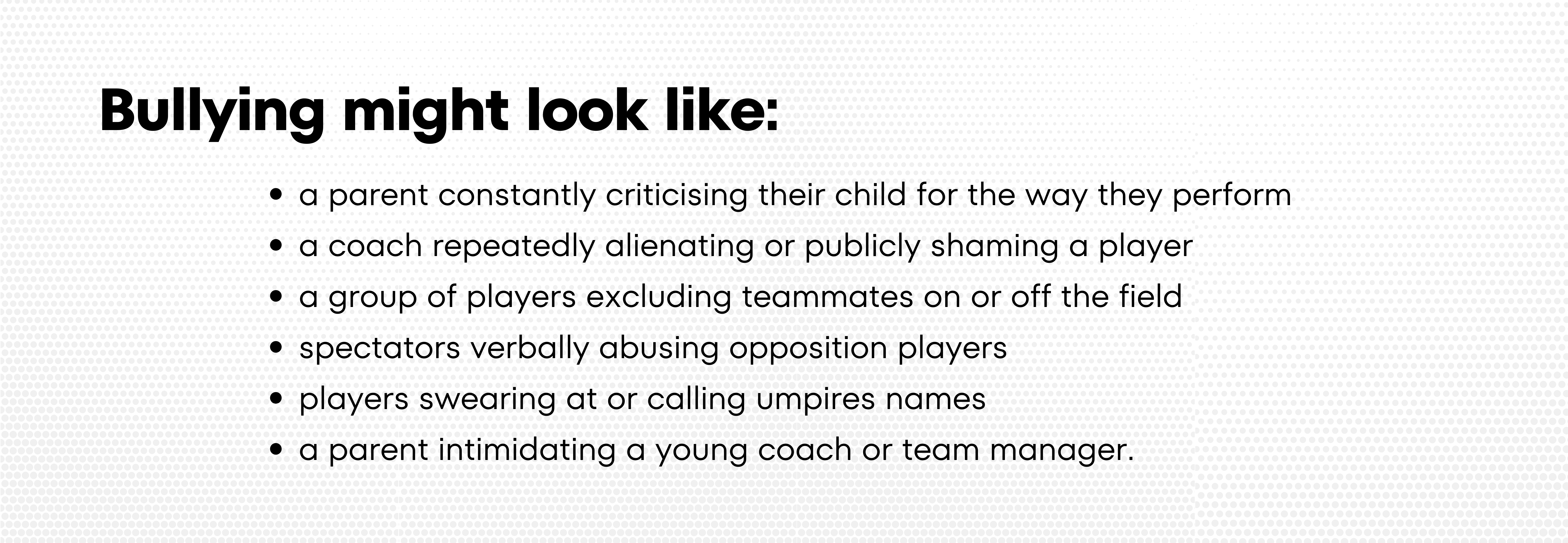We don't tolerate bullying of any kind at our club
If you are being bullied or you know someone who is, please contact:
Michele Creed (Child Safety Officer)
Michele Creed (Child Safety Officer)
child.safety@mtmarthajfc.com.au.
Our club policy
At MMJFC, we take the issue of bullying seriously.
We believe that every person in sport, in every role, has the right to participate in an environment that is fun, safe and healthy. We strive to treat everyone with respect, dignity and fairness.
Bullying denies participants these rights. It can result in feelings of disgrace, embarrassment, shame and intimidation.
Bullying can also affect an individual’s athletic performance, level of enjoyment, work or school life, academic achievement and physical and mental health.
MMJFC takes a zero-tolerance approach to bullying.
What do we mean by 'bullying'?
We define bullying as:
Deliberately hurting a specific person or people physically, verbally, psychologically or socially, and
Behaving in a manner that creates a power imbalance, where one person has power or strength (be it physical, mental, social or financial) over another.
Acting in a way that exerts power over another makes one person stronger or more powerful than another. This can happen if someone is bigger, smarter, more popular or has more money than someone else.
Bullying can be carried out by one person or several people who are either actively or passively involved. In a sports context, bullying can take many forms.

Bullying can be a one-off incident but usually involves repeated actions or incidences. An individual may bully their victim face to face or use technology such as a mobile phone or computer.
What to look for
A person who's being bullied, especially a child, might not always ask for support. They might feel afraid, ashamed or embarrassed, or fear that the person they tell will think they are weak.
Some victims of bullying believe that they deserve to be bullied or that by telling someone what's happening to them they're 'dobbing' or 'snitching'.
Signs that a person is being bullied include:
• finding excuses for not wanting to attend training or games (for example, feeling sick or injured, or having too much work to do)
• talking about ‘hating’ their sport
• wanting to be driven to training or matches instead of walking
• regularly being the last one picked for team or group activities
• being excluded from social or shared activities
• displaying unexplained bruising or other injuries
• becoming uncharacteristically nervous, worried, shy or withdrawn
• repeatedly losing or damaging possessions
• becoming suddenly prone to lashing out at people either physically or verbally.
How all of us can help
Research tells us that bullying is more likely to occur in environments that are highly competitive and promote a ‘win at all costs’ mentality.
Emphasising other aspects of sport, such as enjoyment, teamwork, sportsmanship and skill development—especially at the junior level, may help us prevent bullying behaviour at MMJFC.
But it takes a village.
We ask all MMJFC members (including coaches, managers, officials and parents) to take signs of bullying seriously. You can do this by:
Showing interest and sympathy with every allegation of bullying and provide support (remember that it takes a lot of courage for a child to admit they are being bullied).
Ensuring the victim/s are safe.
Being accountable. Don’t gossip, take action!
Being aware that some forms of bullying constitute assault, harassment or discrimination under federal and state legislation and are therefore illegal.
Being proactive. Encourage all members to speak out and tell someone—a parent, coach, manager or senior club member—if they are being bullied or if they witness bullying.
























